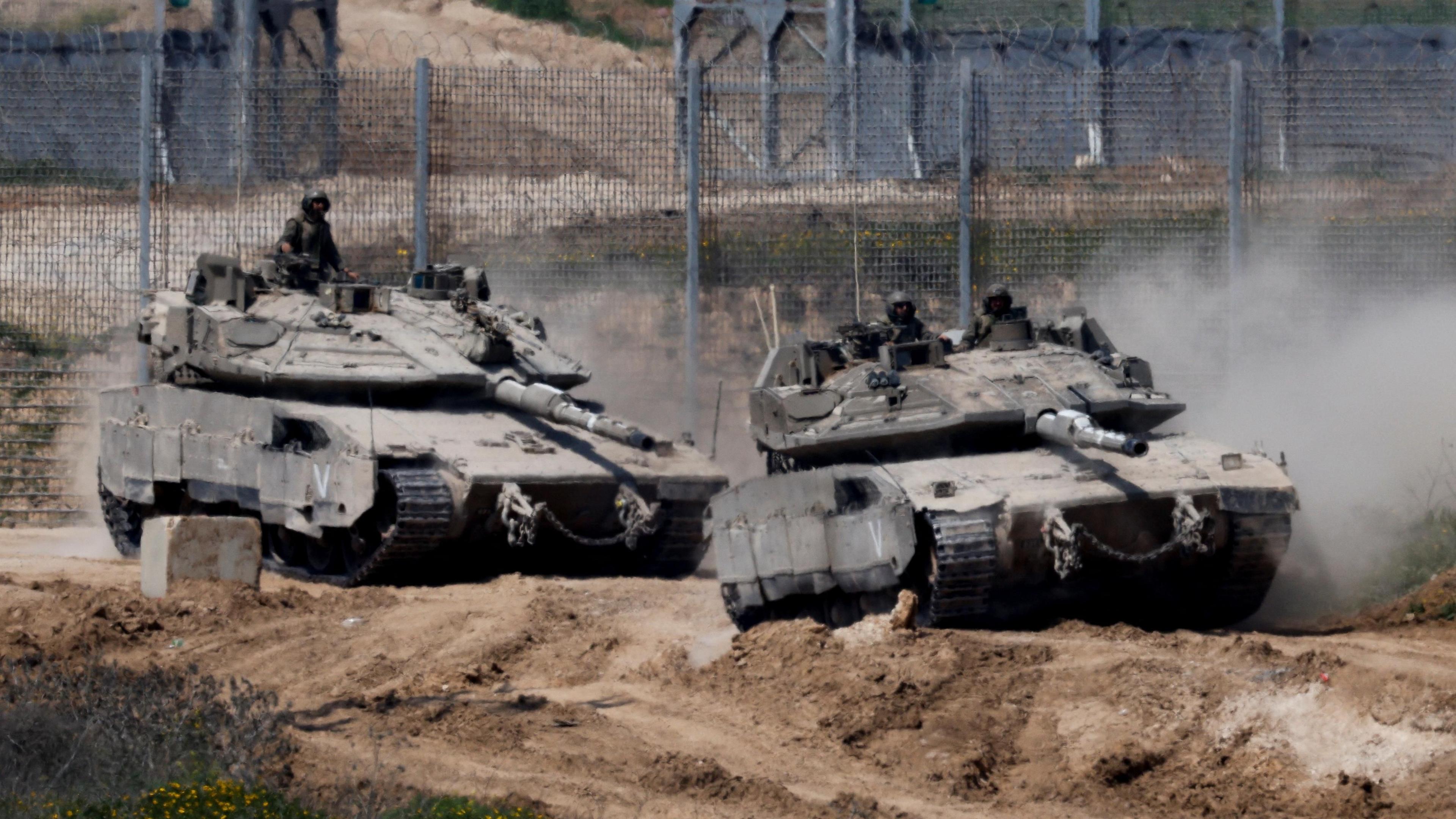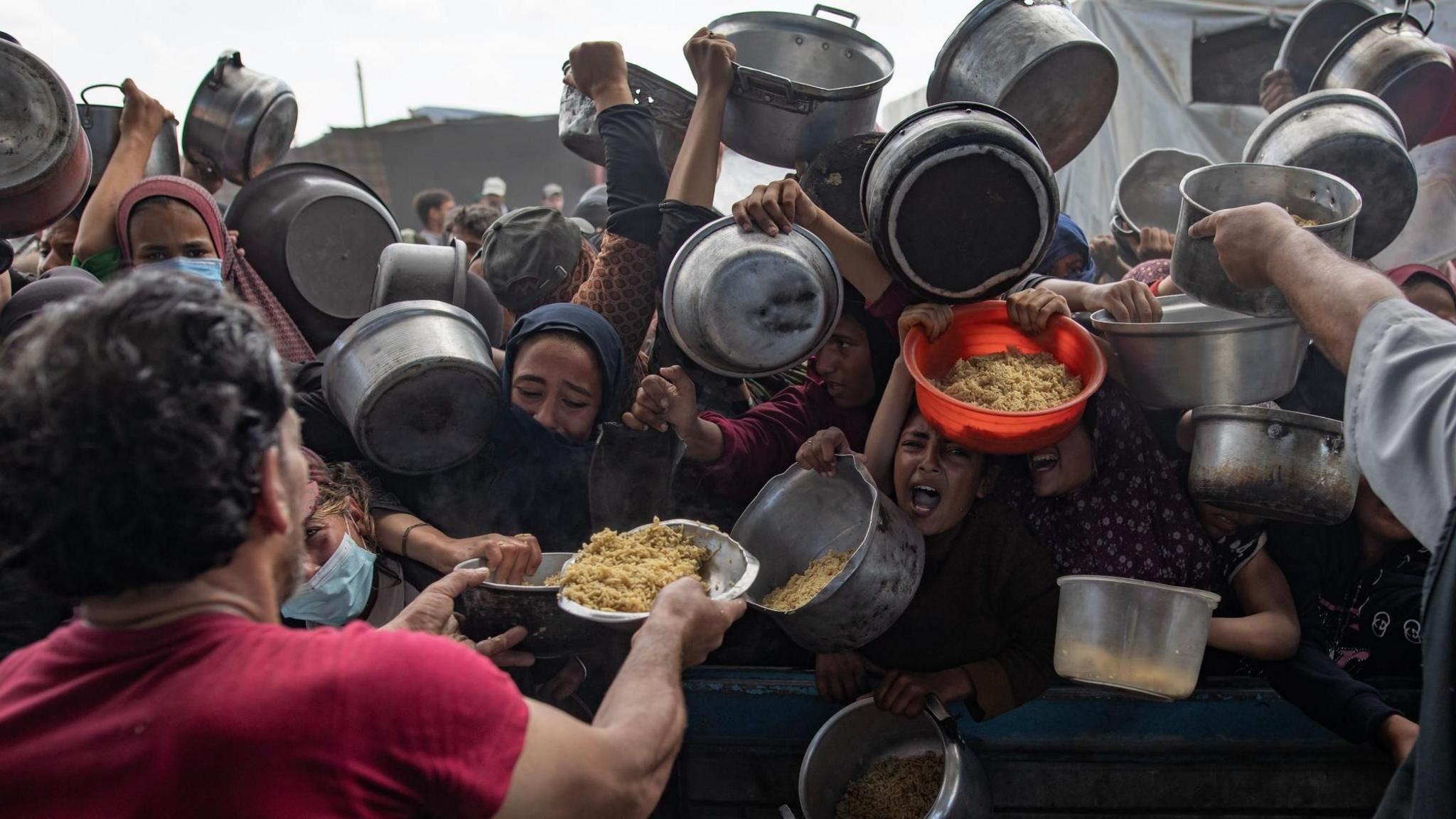Israel security cabinet approves plan to 'capture' Gaza, official says

The Israeli military has called up tens of thousands of reservists, saying it is aiming to increase pressure on Hamas
- Published
Israel's security cabinet has approved a plan to expand its military offensive against Hamas which includes the "capture" of Gaza and the holding of its territory, according to an Israeli official.
Prime Minister Benjamin Netanyahu said the cabinet had decided on a "forceful operation" to destroy Hamas and rescue its remaining hostages, and that Gaza's 2.1 million population "will be moved, to protect it".
He did not say how much territory would be seized by troops, but he stressed that "they will not enter and come out".
The cabinet also approved, in principle, a plan to deliver aid through private companies, which would end a two-month blockade the UN says has caused severe food shortages.
The UN and other aid agencies have said the proposal would be a breach of basic humanitarian principles and that they will not co-operate.
A Hamas official said the group rejected Israel's "pressure and blackmail".
Asked about the Israeli plan to expand its offensive, President Donald Trump repeated a pledge to help get food to Palestinians there.
The UK meanwhile said it "does not support an expansion of Israel's military operations in Gaza". The EU earlier urged restraint, saying it was concerned about "further casualties and suffering for the Palestinian population".
- Published18 hours ago
- Published4 days ago
Israel's security cabinet met on Sunday evening to discuss the Gaza offensive, which resumed when Israel ended a two-month ceasefire on 18 March.
An Israeli official who briefed the media on Monday morning said ministers voted unanimously to approve a plan proposed by the Israeli military's Chief of Staff Lt Gen Eyal Zamir to "defeat Hamas in Gaza and return the hostages".
"The plan will include, among other things, the capture of the Strip and holding the territories, moving the Gazan population south for its defence, denying Hamas the ability to distribute humanitarian supplies, and powerful attacks against Hamas," the official said.
Israeli media reported that first stage would include the seizure of additional areas of Gaza and the expansion of the Israeli-designated "buffer zone" running along the territory's borders. It would aim to give Israel additional leverage in negotiations with Hamas on a new ceasefire and hostage release deal.
Later, a senior Israeli security official said the plan would not be implemented until after US President Donald Trump's visit to the region between 13 and 16 May, providing what he called "a window of opportunity" to Hamas to agree a new ceasefire and hostage release deal.
Far-right Finance Minister Bezalel Smotrich meanwhile told a conference in Jerusalem on Monday that Israel was "going to finally occupy the Gaza Strip", according to Reuters news agency.
Israel occupied Gaza in the 1967 Middle East war along with the West Bank. It unilaterally withdrew troops and settlers from Gaza in 2005, but the UN still regards Gaza as Israeli-occupied territory because it retained control of Gaza's shared border, airspace and shoreline.
In a briefing later on Monday, the Israel Defense Forces (IDF) said the expanded campaign would displace most Palestinians in Gaza as air strikes and other military operations continued.
However, critics say military action has failed to secure the return of the 59 remaining hostages - up to 24 of whom are believed to be alive - and have urged the government to strike a deal with Hamas.
The Hostages and Missing Families Forum, which represents hostages' relatives, said the plan was an admission by the government that it was "choosing territories over the hostages" and that this was "against the will of over 70% of the people" in Israel.
Hamas official Mahmoud Mardawi reiterated that the group wanted a comprehensive deal, including "a complete ceasefire, full withdrawal from Gaza, reconstruction of the Gaza Strip, and the release of all prisoners from both sides".
Palestinians in north Gaza told the BBC that they were strongly opposed to being forcibly displaced to the south once again, with several saying they would rather die amid the ruins of their homes.
"In October 2023, I evacuated with my children, daughters, and grandchildren - about 60 people in total," 76-year-old Gaza City resident Ahmed Shehata said.
"We lived through unbearable conditions in what Israel claimed was a 'safe zone' in the south. This time, we will not leave, even if Israel brings down the tents over our heads."
Osama Tawfiq, a 48-year-old father of five, said: "Israeli threats won't scare us. We are staying in Gaza."

Gaza's community kitchens say they are days away from running out of supplies
The Israeli official said the security cabinet also approved by a large majority "the possibility of humanitarian [aid] distribution - if necessary - that would prevent Hamas from taking control of supplies and would destroy its governmental capabilities".
The security official said deliveries would resume once the expanded offensive began, and that the military would establish a "sterile area" in the southern Rafah area that Palestinians would be able to enter pending inspection.
On Sunday, the Humanitarian Country Team (HCT), a forum that includes UN agencies, said Israeli officials were seeking to "shut down the existing aid distribution system" and "have us agree to deliver supplies through Israeli hubs under conditions set by the Israeli military, once the government agrees to re-open crossings".
The HCT warned that the plan would mean large parts of Gaza, including less mobile and most vulnerable people, would continue to go without supplies.
"It contravenes fundamental humanitarian principles and appears designed to reinforce control over life-sustaining items as a pressure tactic – as part of a military strategy," it said.
"It is dangerous, driving civilians into militarized zones to collect rations, threatening lives, including those of humanitarian workers, while further entrenching forced displacement."
Israel cut off all deliveries of humanitarian aid and other supplies to Gaza aid on 2 March, two weeks before resuming its offensive.
According to the UN, the population is facing a renewed risk of hunger and malnutrition because warehouses are empty, bakeries have shut, and community kitchens are days away from running out of supplies.
The blockade has also cut off essential medicines, vaccines and medical equipment needed by Gaza's overwhelmed healthcare system.
The UN says Israel is obliged under international law to ensure supplies for Gaza's population, almost all of whom have been displaced. Israel says it is complying with international law and there is no shortage of aid.
The Israeli military launched a campaign to destroy Hamas in response to an unprecedented cross-border attack on 7 October 2023, in which about 1,200 people were killed and 251 others were taken hostage.
At least 52,567 people have been killed in Gaza since then, including 2,459 since the Israeli offensive resumed, according to the territory's Hamas-run health ministry.